***Just a quick note to tell you about the fabulous Bake Sale For Haiti that is going on today! My X’s and G’los Valentine’s Day Variety Pack is up for auction (including the new S’moooooooooooore bar!!) in addition to a TON of other delicious looking goodies!*** :mrgreen:
~~~~~~
Hey guys!
Sorry about my disappearance today. I have been going through some personal stuff and had to attend to that in addition to my work.
But alas, I am here as soon as I could be, and I have quite an interesting topic I would like to discuss!
You may or may not be aware that I am a huge Dr. Oz fan. I saw his very first appearance on Oprah and I was immediately a fan. I own almost all of his books and I just love his balanced approach to health. Each week I check his website and see what shows I want to see and then I set the VHS to tape it. (Yes, I said VHS…remember those? No PVR here. We don’t have cable!) :oops:
I taped today’s episode because I love the topic. It was on common everyday foods that may be poisoning us. I was intrigued to find out what Dr. Oz had to say!
Dr. Oz said there are three main poisons in our food:
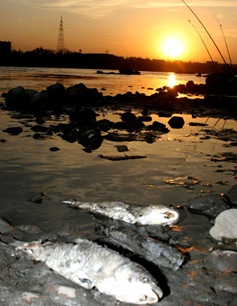 1) Mercury
1) Mercury
90% of all mercury in our blood is derived from eating fish. High levels of mercury have been shown to attack the brain and nervous system. ‘Fish Fog’ is a term used to describe a person with mercury poisoning; symptoms often include foggy and unclear thinking, difficulty concentrating, etc.
While most fish contain some mercury, the fish with the highest level of mercury is the sushi-grade tuna, according to Dr. Oz. He advised against eating tuna often. Interestingly enough, Dr Oz’s study found that Albacore tuna (which is an expensive type of tuna) actually had higher mercury levels than regular chunk light tuna (the cheap stuff!). I found this quite shocking! When I used to eat fish, I always tried to buy Albacore because I thought it was safer. Not true, says Dr. Oz. Albacore tuna is higher in mercury because it is a bigger and older fish. As a general rule of thumb, bigger and older fish will have higher levels of mercury in them. Fish with high levels of mercury include: Sushi, tuna, and tilefish, among others.
Dr. Oz recommends selecting small and young types of fish like herring, sardines, and even salmon as safer choices for lower mercury levels.
There was a time in university when I used to live off of tuna. I’m not even joking. Canned chunk light tuna was cheap and I ate a can everyday. :cry: Maybe my exam scores would have been higher had I not?? ;)
2) Pesticides
On virtually all non-organic fruit and vegetables, pesticides can be found. In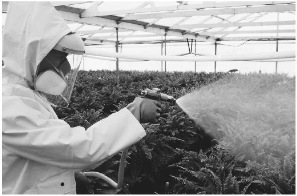 some human and animal research, pesticides are thought to increase the risk of ADHD, autism, and obesity.
some human and animal research, pesticides are thought to increase the risk of ADHD, autism, and obesity.
Now don’t stop eating your fruits and veggies, instead become a wise consumer of what you select.
Obviously organic produce is expensive, so that is why we can find out what fruits and vegetables are at the lowest risk for pesticides and try to purchase those whenever possible. I tend to follow the Dirty Dozen (and clean fifteen) rules of thumb whenever possible.
If you can only purchase one fruit that is organic, they suggest buying organic apples. Why? Because people tend to eat a lot of apples and it is on the dirty dozen list.
If you can only purchase one organic vegetable than purchase organic potatoes. I didn’t know this, but potatoes are one of the worst vegetables for pesticides, so much so that the pesticides seep through the skin into the actual potato. For some reason I thought that potatoes would have a thick skin and be resistant to pesticides, but that doesn’t seem to be the case. I would like to add that two vegetables I always buy organic are spinach and kale, as they are near the top of the list and I eat them very frequently (For organic spinach that is about half the price- go to Costo! I just discovered this myself.) Low-risk vegetables like cucumbers, onions, cabbage, eggplant, asparagus, and broccoli, I do not buy organic in an effort to save money.
3) Bisphenol A (BPA)
 Ninety-three percent of adults have some amount of BPA in their blood. BPA is a building block found in many plastics and linings of cans. BPA is thought to increase the risk of infertility, cancer, diabetes, and obesity (however this is widely debated).
Ninety-three percent of adults have some amount of BPA in their blood. BPA is a building block found in many plastics and linings of cans. BPA is thought to increase the risk of infertility, cancer, diabetes, and obesity (however this is widely debated).
How can we protect ourselves against BPA?
- Check the number on the bottom of the plastic. Number 7 (hard clear plastic) contains BPA. Number 3 (PVC) and Number 6 (Polystyrene) are also known to leach chemicals.
- Buy fresh food whenever possible
- If you can’t buy fresh food, buy frozen food instead of cans
- Select glass containers as opposed to cans
- Do not freeze or microwave plastic
So there you have it, three poisons in our everyday foods, according to Dr. Oz.
Personally, I think it is a shame that we have to worry about our food so much in this day and age. Everything just seemed so much more simple a 100 years ago! It is quite sad when I think about the state that our food system is in. For the most part, the food industry is all about cranking out the most amount of food for the lowest amount of cost. In turn, our food has become compromised in a huge, huge way. Pesticides, GMO’s, and other chemicals are the norm.
I feel like everywhere we turn, there is a new study out there saying that this food is bad to eat or this chemical is in our food. When will it end? And most importantly, will there ever be a day in our future when we can feel confident in the food that we put in our bodies? Or will the system continue to get worse?
I try not to get bogged down too much about BPA or other such things because I think that it is impossible to avoid it entirely. I also think it is still too early to really know what effect these things are having on our bodies. For now I just try to make sensible choices when I can and not let myself lose sleep over it. If I listened to all the reports, there wouldn’t be anything left to eat!
What are your thoughts on the 3 above mentioned ‘poisons’? Do you avoid any of them :?:
Time to catch some zzzzzz’s. Been a long day. Nighty night, don’t let the bed bugs bite.

There are no seasons in the American supermarket. Now there are tomatoes all year round, grown halfway around the world, picked when it was green, and ripened with ethylene gas. Although it looks like a tomato, it’s kind of a notional tomato. I mean, it’s the idea of a tomato. ~Michael Pollan

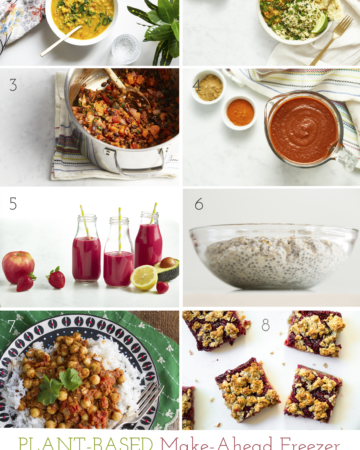
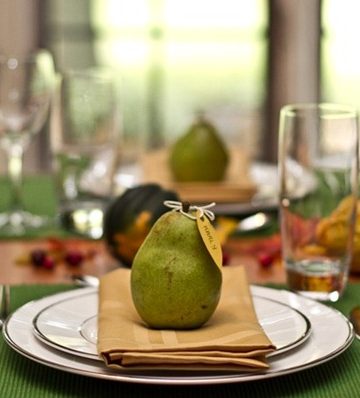
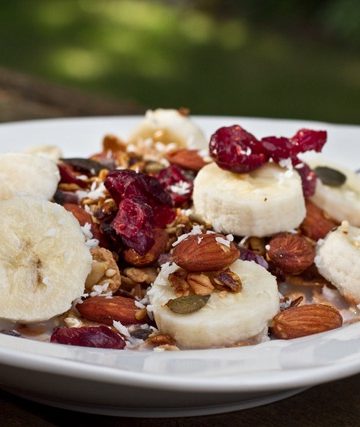
wow! great info! i love dr. oz too!
Hi, I finally have a chance to add my “two cents worth”. We do not have a lot of money. In fact we are the a standard middle class family with limited extra money. However, we ALWAYS buy organic milk, apples, onions, potatoes and as many others as we can afford that week. Also, our family never eats anything that has been heated up in plastics (avoid those estrogens) and rarely eats items with artificial colours and flavours.
Here is my soap-box: I inwardly cringe when supposedly-healthy people (in our society healthy=thin) drink diet drinks, no-fat cheese, artificial butter spray and lay out in the sun on their pesticide infested yards. We must remember that outward beauty, i.e. botoxed skin, a perfect yard and a gorgeous shiny apple, are often made more beautiful by toxins that harm us in the end. Organic foods are typically smaller, a little misshapen and sometimes have a worm hole or two. In other words, organic foods are a little more like us. I like that.
Happy healthy eating.
Thanks for asking, Angela.
I had heard that any veggie or fruit that has a skin that you intend to eat should be your organic purchases. Thanks for the tips on finding BPA-free plastics. I’ll be certain to look out for these!
I really don’t think that, in this day and age of research, we will be able to feel 100% confident about ANYTHING we eat. It seems there will always be one story or another about hidden dangers. I’m a firm believer that the closer food is to the way it was “born”, the safer it is to eat. Clean eating all the way for me!
Yup! I agree with it all!
I eat all organic fruit and veg because I know my body likes it better! I do not eat canned goods on a regular as they freak me out now :)
And well mercury is a whole other story…..YIKES is all I can say!
XXOO
Kris
Ps. DR.OZ Rocks! I loved his video on the water issue :|
Hey Angela…hang in there hun, you are so strong and healthy – you’ll get through it! :)
I am a huge Dr. Oz fan as well. I own several of his books and follow his shows. I like his frank and easy-to-understand advice. I wish all physicians had his bedside manner. Anyway, the chemical thing is a fairly strong concern of mine. I’m a new vegan (2 weeks in) and pack my lunch everyday for work. I’m really starting to feel AMAZING and becoming more atune to what’s going into my body. I’m slowly replacing the plastic containers I take my lunch to work in with small glass (Pyrex) containers. I feel better about reheating my food in glass. I’ve also read The Kind Diet by Alicia Silverstone…she even goes as far to suggest microwaves damage our food. It seems everywhere you turn, there’s one more thing that’s killing us. Very depressing and can drive a person mad if you consider every single lick of information. What’s most frustrating is the conflicting studies and reports. There isn’t much conclusive evidence one way or the other.
I think minimizing the risks is the best we can do at this point. I also have 3 small children…and I’m doing my best to educate them and teach them how to care for their bodies via clean, sustainable lifestyle choices.
Oh Angela I really hope everything its ok I just couldnt pay attention to your article cause I was just wishing everything is ok I wish you the best and Im sure Ill be delighted when Iread ur article with my full attention Wish u THE BEST!!
I’m currently reading Omnivore’s Dilemma for class and just read about nitrogen, pesticides, etc. SCARY STUFF!! I always get really scared of food when I am exposed to this kind of information. Sad. It shouldn’t be that way.
I try to buy organic when I can, especially with things like apples, since I eat it peel and all. After seeing documentaries and reading books about these sorts of topics, it always stood out to me that farmers who grow for corporate farms won’t eat the produce because they spray it with so many chemicals!
The research I’m involved in is centered around modeling chemical substances and their effects on the body- I do more with pharma but I learned a ton about pesticide and other environmental toxins when I was starting- it is pretty scary. I have a graduate student budget but still try to buy organic.
Um, sorry, that was a long response, but in summary, YES I try to avoid pesticides and food chemicals!
I don’t worry about mercury too much since I limit my tuna to about twice a week. I wish I could avoid pesticides and BPA more, but right now I have to get by with dorm food, and fruits and veggies with pesticides have to be better than none, right?! Nice post though!
i try to avoid all of them honestly, but i can’t say i go out of my way to pay extra for organic produce that’s free of pesitcides and whatnot. i try to clean it all as best i can before use though!
hope everything’s OK…i’m going through personal stuff as well and know it’s not super fun. you’re in my thoughts :)
I honestly think that it totally sucks that I have to buy cheaper pesticide laden produce…I see the organic produce along side the “regular normal produce” (Which in reality and with history is NOT normal or healthy) and I have to choose the pesticide thousand mile journey produce in favour over the organic stuff because it’s simply is not in my budget…due to being a student and paying all the rest of the billages….
Oh when did the bottom line take over the well-being of general society?
Oh and this totally twists my panties in a bunch….I long for the day when organic totally natural produce will overtake the pesticide GMO foods of our current supermarket settings.
Thank you very much for this interesting post. I didn’t knew the things about the mercury and the bisphenol – freaking…
On the other side it’s important not becoming to scared about what you eat (pesticides, additives, microwave, teflon and and and…), because if we are only paying attention to the bad things around us we are more likely harmed than if we are focussing on the good nutrition etc. These days it’s impossible to life completely healthy. Although we should try to make sensitive choices we should not let this healthy living thing overcome us.
Hi Angela, haven’t commented in a while here but always reading :-)
Thanks for the info, I downloaded the dirty dozen app on my iphone a couple of days ago, I’ll try to stick to it as much as I can, I guess the pesticide level is the same everywhere in the world.
Anyway I always buy my apples organic, I love apples and the organic ones I find at the supermarket taste much better than the regular ones for a start!
I was also surprised by the potato info, I too believed that they were quite “safe” what with the thick skin!
For mercury, well as a vegetarian I don’t eat fish, so that’s not a big concern, but I wasn’t really aware about the BPA, that’s scary, I’ll pay more attention from now on.
Hope everything’s alright with you.
Hi Angela and others – just a quick plea related to your interesting info on fish and food safety. Even MORE important to consider than mercury levels is the threat of extinction for many ocean fish. Most fishing industries are not sustainable at all and so we need to be especially careful to eat fish rarely, and then to choose species that are not endangered, or sources that have been verified as sustainable. I recommend the following two websites for more info, but these are probably geared to consumer choice in the UK – you may be able to find equivalent organisations in Canada and the US.
http://www.fishonline.org/
http://www.msc.org/
Ange-
Question….how do you feel about the fruit and veggie wash that comes in a spray bottle? I have never bought it but i always look at it and wonder.
I’ve heard that using white vinegar and water cleans vegetables better than the veggie wash stuff (and much cheaper too!)
http://www.greendaily.com/2007/10/01/vinegar-and-water-gets-fresh-fruit-the-cleanest-better-than-s/
thanks!!
Angela- I am new to your blog and enjoy it very much! Have you read “The Food Revolution” by John Robbins and “The China Study”? I read them a few years ago and immediately went vegetarian and organic (trying to go vegan). VERY good books!!
I hope everything is okay girl! Interesting topic. I would love to eat all organic produce but that’s just not possible with my budget so I just try to do the best that I can.
I do pay attention to mercury, pesticides, and BPAs. We try to take action is doing things to prevent them – the only once I am fairly skeptical about is mercury. When I trained for one of my fitness shows I ate tuna like 2-3 times a day for months! I know alot of other people who did this too. Granted I really don’t eat it anymore, and I’m sure it happens if you eat it that way for YEARS. I did know that chunk light had less mercury, but my mom was all about albacore too!!
I do try to be aware of what is “bad” like know the dirty dozen, be educated on things like BPA, etc. But most of the time it’s like water off a duck’s back to me. I’ll do it when it makes financial or organizational sense to me, but there is no way I’m gonna spend my life freaking out over stuff that I basically have little control over. Will eating this conventional apple today eventually set off the chain of events that gives me cancer in thirty years?? How about this sip of water out of a plastic bottle? That’s just too exhausting for me. :)
Hope your personal life sorts out in a positive direction soon!
I too sometimes feel that I have to be careful of everything I eat and drink. I know about the tuna and hate that it’s so high in mercury as I love to add it to salad. I think I need to work on completely removing it from my meals.
I appreciated this post because I think you emphasize a balanced approach. On the one hand, we need to be aware of what we’re putting into our bodies (at least as aware as we can be), so that we can make the best, most informed choices for ourselves. On the other hand, if we obsess about every little detail we’d never be able to eat anything! Your approach – and in my opinion the best one – is to try to find a middle ground between the extremes of worrying about everything and caring about nothing.